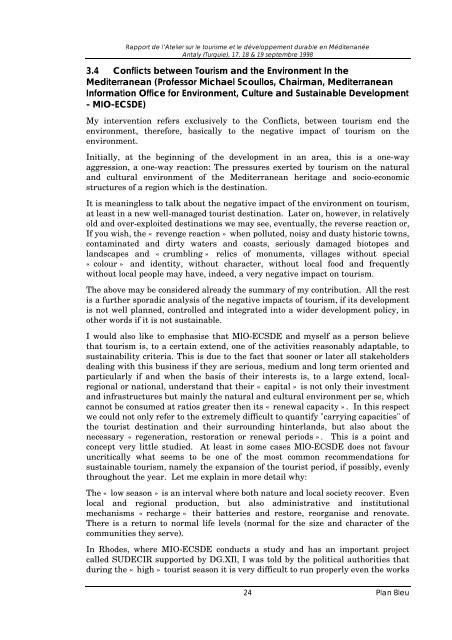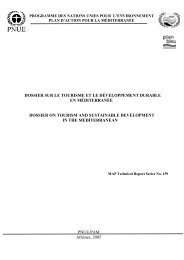MEDITERRANEAN ACTION PLAN
MEDITERRANEAN ACTION PLAN
MEDITERRANEAN ACTION PLAN
Create successful ePaper yourself
Turn your PDF publications into a flip-book with our unique Google optimized e-Paper software.
Rapport de l’Atelier sur le tourisme et le développement durable en Méditerranée<br />
Antaly (Turquie), 17, 18 & 19 septembre 1998<br />
3.4 Conflicts between Tourism and the Environment In the<br />
Mediterranean (Professor Michael Scoullos, Chairman, Mediterranean<br />
Information Office for Environment, Culture and Sustainable Development<br />
- MIO-ECSDE)<br />
My intervention refers exclusively to the Conflicts, between tourism end the<br />
environment, therefore, basically to the negative impact of tourism on the<br />
environment.<br />
Initially, at the beginning of the development in an area, this is a one-way<br />
aggression, a one-way reaction: The pressures exerted by tourism on the natural<br />
and cultural environment of the Mediterranean heritage and socio-economic<br />
structures of a region which is the destination.<br />
It is meaningless to talk about the negative impact of the environment on tourism,<br />
at least in a new well-managed tourist destination. Later on, however, in relatively<br />
old and over-exploited destinations we may see, eventually, the reverse reaction or,<br />
If you wish, the « revenge reaction » when polluted, noisy and dusty historic towns,<br />
contaminated and dirty waters and coasts, seriously damaged biotopes and<br />
landscapes and « crumbling » relics of monuments, villages without special<br />
« colour » and identity, without character, without local food and frequently<br />
without local people may have, indeed, a very negative impact on tourism.<br />
The above may be considered already the summary of my contribution. All the rest<br />
is a further sporadic analysis of the negative impacts of tourism, if its development<br />
is not well planned, controlled and integrated into a wider development policy, in<br />
other words if it is not sustainable.<br />
I would also like to emphasise that MlO-ECSDE and myself as a person believe<br />
that tourism is, to a certain extend, one of the activities reasonably adaptable, to<br />
sustainability criteria. This is due to the fact that sooner or later all stakeholders<br />
dealing with this business if they are serious, medium and long term oriented and<br />
particularly if and when the basis of their interests is, to a large extend, localregional<br />
or national, understand that their « capital » is not only their investment<br />
and infrastructures but mainly the natural and cultural environment per se, which<br />
cannot be consumed at ratios greater then its « renewal capacity » . In this respect<br />
we could not only refer to the extremely difficult to quantify "carrying capacities" of<br />
the tourist destination and their surrounding hinterlands, but also about the<br />
necessary « regeneration, restoration or renewal periods » . This is a point and<br />
concept very little studied. At least in some cases MlO-ECSDE does not favour<br />
uncritically what seems to be one of the most common recommendations for<br />
sustainable tourism, namely the expansion of the tourist period, if possibly, evenly<br />
throughout the year. Let me explain in more detail why:<br />
The « low season » is an interval where both nature and local society recover. Even<br />
local and regional production, but also administrative and institutional<br />
mechanisms « recharge » their batteries and restore, reorganise and renovate.<br />
There is a return to normal life levels (normal for the size and character of the<br />
communities they serve).<br />
In Rhodes, where MIO-ECSDE conducts a study and has an important project<br />
called SUDECIR supported by DG.XIl, I was told by the political authorities that<br />
during the « high » tourist season it is very difficult to run properly even the works<br />
24<br />
Plan Bleu
















